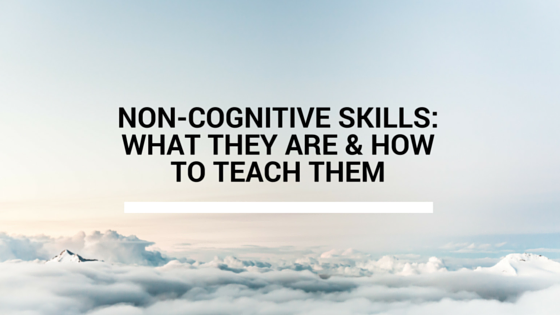
Non-cognitive skills refer to a set of skills that fall outside of traditional definitions of intelligence but still allow individuals to contribute meaningfully to society and to achieve success (e.g. critical thinking skills, social skills, persistence, creativity). Non-cognitive skills are critical because studies show that non-cognitive skills in students are significant predictors of positive outcomes in adulthood, including employment, likelihood of incarceration, mental health, substance abuse, and education. In addition, other studies show that students with higher levels of non-cognitive skills are more likely to engage in political activity and voting as adults. This article identifies the most important non-cognitive skills and how professors can teach them in the classroom.
Perseverance
Perseverance refers to steadfastness on mastering a skill or completing a task; a major component of perseverance is grit, which refers to the tendency to sustain interest in and effort toward very long-term goals. Professors can help teach perseverance by breaking down large tasks — such as the completion of a term paper — into smaller ones and making sure students are meeting expectations each step of the way. When a task is broken down into smaller components, it becomes easier for students to persevere.
In addition, professors can help develop growth mindsets in their students: instead of using permanent value judgements like “this problem is too hard,” students should use language like “I need more time and effort” (another example of a growth mindset language would be saying “I am going to work hard to learn how to do this” instead of saying “I can’t do this”). When professors hear students using fixed mindset language, they should encourage their students to develop a growth mindset.
Metacognitive Strategies
Metacognitive strategies are “goal-oriented efforts to influence one’s own learning behaviors and processes by focusing awareness on thinking and selecting, monitoring, and planning strategies that are most conducive to learning.” They might include setting goals, planning and problem-solving, being aware of one’s strengths and growth areas, and knowing when and why to use certain strategies.
One way professors can teach metacognitive strategies is encourage students to reflect upon how they studied for various exams and whether or not that strategy worked. For example, a student may have used flashcards for one exam and done very well, and then not had time to use flashcards on a following exam and did poorly as a result. Requiring students to complete reflection sheets about how they prepared for exams is one example of how professors can teach metacognitive skills and encourage students to identify their own learning styles.
Creativity
Creativity is another important non-cognitive skill that is defined as the production of novel and useful ideas. While some people disagree whether or not creativity is an aspect of intelligence or a personality trait, contemporary researchers generally agree that most individuals are capable of creating creative work in some domain. Creativity is an important non-cognitive skill because it has a significant association with overall grade point average and with flexibility and malleability.
There are several ways professors can encourage creativity in the classroom. First and foremost, professors need to make sure their course is a “safe space” for students to make errors; when the stakes are high, students revert to safer, more conventional ideas, killing their creativity and risk-taking. In addition, students should receive informative feedback because critical but kind feedback can give them ideas about how to take their project in a new direction.

